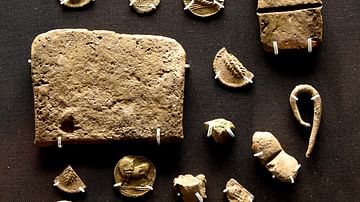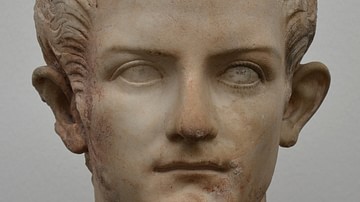Search
Did you mean: Claudius?
Search Results

Article
The Assassination of Julius Caesar
Veni, vidi, vici! This was the simple message the Roman commander Julius Caesar sent to the Senate in Rome after a resounding victory in the east against King Pharnaces of Pontus - a message that demonstrated both arrogance as well as great...

Article
Marcus Aurelius: Plato's Philosopher King
Plato's concept of the Philosopher-King (one who governs according to philosophical precepts and higher truths) is thought to be best exemplified through the Roman emperor Marcus Aurelius Antoninus (r. 161-180 CE), the last of the Five Good...

Article
Treasure Hoards in Ancient Literature
Aristophanes wrote in the 5th century BCE about coin hoards in Athens. He joked about the common saying, "No one knows but the birds where I hid my money," which led buffoons in his play to follow birds around with a shovel, hoping to excavate...

Definition
Julius Caesar
Gaius Julius Caesar was born 12 July 100 BCE (though some cite 102 as his birth year). His father, also Gaius Julius Caesar, was a Praetor who governed the province of Asia and his mother, Aurelia Cotta, was of noble birth. Both held to the...

Definition
Ancient Rome
According to legend, Ancient Rome was founded by the two brothers, and demigods, Romulus and Remus, on 21 April 753 BCE. The legend claims that in an argument over who would rule the city (or, in another version, where the city would be located...

Definition
Roman Army
The Roman army, famed for its discipline, organisation, and innovation in both weapons and tactics, allowed Rome to build and defend a huge empire which for centuries would dominate the Mediterranean world and beyond. Overview The Roman...

Definition
Cleopatra VII
Cleopatra VII (l. c. 69-30 BCE, r. 51-30 BCE) was the last ruler of Egypt before it was annexed as a province of Rome. Although arguably the most famous Egyptian queen, Cleopatra was actually Greek and a member of the Ptolemaic Dynasty (323-30...

Definition
Agrippina the Younger
Julia Agrippina or Agrippina the Younger (6 November 15 - 19/23 March 59 CE) was a prominent woman during the early Roman Empire, niece to Tiberius (r. 14-37 CE) and Claudius (41-54 CE), whom she married, sister of Caligula (r. 37-41 CE...

Definition
Trajan
Trajan, or Marcus Ulpius Traianus, was Roman emperor from 98 to 117 CE. Known as a benevolent ruler, his reign was noted for public projects which benefitted the populace such as improving the dilapidated road system, constructing aqueducts...

Definition
Caligula
Caligula (Gaius Julius Caesar Augustus Germanicus) was Roman emperor from 37 to 41 CE. Among the great emperors of the Roman Empire stand Augustus and Marcus Aurelius. At the other end of the spectrum is Emperor Caligula who the historian...